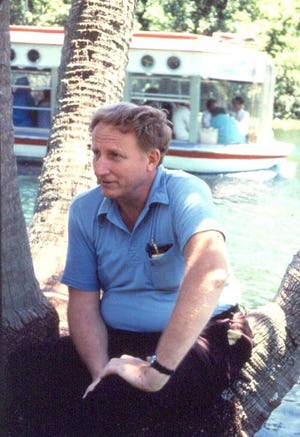
A fitting tribute to Dr. Robert Knight’s mentor who did so much for Florida’s springs. Knight is following in his footsteps, although Odum’s journey was through acquisition of knowledge while Knight’s is through a morass of political obstacles designed to protect any type of business regardless of its damage to the springs and rivers.
Knight is easily the best known environmentalist and advocate for the springs and has now reached the status of his mentor.
He has in his arsenal a solid scientific base in water science, major publications, years of experience and no obligation to skew his findings to fit political whims.
His is an unbiased voice among state employees whose first mission may be to keep their jobs. They work in a system that will not tolerate truth if it does not conform to current politics to favor agriculture and industry.
A sad state indeed, but one which prevails in Florida.
Read the complete article here at this link in the Gainesville Sun.
Comments by OSFR historian Jim Tatum.
jim.tatum@oursantaferiver.org
– A river is like a life: once taken,
it cannot be brought back © Jim Tatum
Howard T. Odum expanded knowledge about springs, ecosystems, wetlands and energy
July 29, 2022
After earning a Ph.D. in zoology from Yale in 1950, Odum chose to start his academic career at UF. Born and raised in Chapel Hill, North Carolina, “H.T.” had a passion for birds and the environment from a young age. Florida’s diverse and abundant wildlife, natural wetlands and other exotic aquatic habitats appealed to his sense of adventure and curiosity, and it was here that he initiated his 50-year pursuit of knowledge about how the world works.

Unique among ecologists at the time, Odum believed that it was critical to understand the role of humans in shaping our natural world. His first scientific accomplishment was a four-year study of Silver Springs, Florida’s largest and most visited spring.
Working with more than 20 collaborators, Odum’s team described and quantified all the levels of nature’s organization — the flows of energy and materials — from the tiniest algae, through the wildlife food web, all of the way up to the thousands of tourists in glass-bottom boats and their effects on the springs. Published in 1957, Odum’s Silver River research revolutionized the way scientists think about ecosystems; 65 years later, it’s still the gold standard in ecosystem ecology.
Odum’s work at Silver Springs and Silver River became the basis for systems ecology, an innovative new academic field seeking to understand the interactions between the natural and human-built worlds. Odum trained an international generation of “systems thinkers” to consider both quantitative and qualitative understandings of the natural world, including people.
As early as 1962, Odum began developing another new scientific idea, ecological engineering, combining ecology and engineering to integrate human society with its natural environment for their mutual benefit. With a tremendous ability to filter and slowly release flood waters, store carbon, cool the local environment and provide unique habitats, wetlands are the iconic ecological engineering ecosystem.
In the early 1970s, Odum pioneered research on the use of natural wetlands for the treatment and recycling of wastewater, initiating groundbreaking research in the fields of wetland restoration, creation and management that continues today.
Odum recognized the telltale rise in atmospheric carbon dioxide from the burning of fossil fuels long before it was news. He saw the damaging effects of increasing groundwater extractions on Florida’s springs, wetlands and lakes. He conceptualized and demonstrated the potential for recycling society’s wastewater through treatment wetlands to help slow the rate of groundwater depletion and pollution that we continue to see today.
At UF and the Florida Springs Institute, we continue Odums’ legacy and invite you to learn more about Florida’s springs and wetlands. The institute offers a Springs Academy (see: floridaspringsinstitute.org/springs-academy)
The Center for Wetlands hosts weekly “Water, Wetlands, and Watersheds” seminars every Wednesday (see: cfw.essie.ufl.edu/seminars and www.youtube.com/c/UFHowardTOdumCenterforWetlands)
Dr. Robert L. Knight received his Ph.D. in systems ecology under Dr. Odum in 1980, led the conceptualization and design of the Sweetwater Wetlands in Gainesville, and co-authored the textbook “Treatment Wetlands” with Dr. Robert Kadlec in 1996. Knight studied the ecology of Silver Springs for his doctorate degree and founded and currently directs the Howard T. Odum Florida Springs Institute, where he has published four books and dozens of reports focused on springs ecology, restoration, and protection.
Dr. David Kaplan is an associate professor of environmental engineering sciences at UF and director of the UF Howard T. Odum Center for Wetlands. His research focuses on linkages among the hydrological cycle, ecosystem processes and human activities, with the goal of developing new scientific knowledge and engineering tools to advance natural resources conservation and management.
This column is part of The Sun’s Messages from the Springs Heartland series. More pieces from the series can be found at bit.ly/springsheartland.
Join the conversation
Share your opinions by sending a letter to the editor (up to 200 words) to letters@gainesville.com. Letters must include the writer’s full name and city of residence. Additional guidelines for submitting letters and longer guest columns can be found at bit.ly/sunopinionguidelines.







